Approximately 3 million nurses are delivering their care services across the United States healthcare industry.
Nurses are the front fighters especially in health emergencies; therefore, they acquire a noticeable place in the healthcare sector.
When it comes to billing and reimbursements for the nurses, like other healthcare providers and professionals, nurses also need to meet the many rules, regulations, and requirements to showcase their capabilities of their roles and duties.
One of these requirements is the National Provider Identifier (NPI). While some nurses absolutely need one, others might not, depending on their role and responsibilities.
In this blog, we will clear the fog and set sail on understanding NPI. Do nurses require an NPI number and how can they get it?
What is the National Provider Number (NPI)?
The National Provider Identifier (NPI) is a unique identification number assigned to healthcare providers in the United States.
There are two types of NPI numbers. These include:
- Type 1 NPI: For Individuals like Doctors, physiotherapists, nurses, etc.
- Type 2 NPI: For Organizations like Hospitals, medical offices, labs etc.
It is essential for billing purposes, particularly when dealing with Medicare, Medicaid, and other health insurers.
NPI allows nurses and providers to bill Medicare and Medicaid for services provided to patients.
A national provider number does not contain any personal information about the individual, like the services provided or the practice location.
How is an NPI Number Beneficial for Nurses?
A National Provider Number (NPI) opens many doors for nurses. Whether you’re an advanced practice nurse, a travel nurse, or any healthcare provider involved in billing, having an NPI is essential for compliance, professional recognition, and ease of practice across different healthcare settings.
An NPI:
- improves billing process and makes it more secure by ensuring HIPAA compliance.
- secures patients confidentiality and helps the smooth and secure transfer of patient information.
- enhances the portability of a nurse’s credentials across state lines and various healthcare facilities
- simplifies the administrative responsibilities of advanced practice nurses who are going to expand their scope
- increases revenue when submitting claims electronically to reduce errors than with manual processes such as paper filing.
- ensures that patients can easily access their medical records online that simplifies the patient engagement and reduces the burden on nurses.
When Nurses Need to Get an NPI? (3 Common Scenarios)
While not all nurses are currently required to have an NPI, having one is a proactive step towards staying ahead in your career.
As the healthcare industry continues to digitize and integrate, having an NPI could soon become a standard expectation across many nursing roles.
However, here are the three main scenarios, when the nurses must go for having an NPI:
- Are you in or transitioning to an advanced practice role? If so, obtaining an NPI is likely essential.
- Do you work in a setting where you bill insurers directly or indirectly? If yes, having an NPI can facilitate smoother billing and compliance.
- Are you a travel nurse or planning to work in multiple states? An NPI provides continuity and consistency in your professional identification across state lines. Therefore, you must apply for NPI.
Which Nurses Need an NPI Number?
While not all nurses need an NPI, certain nursing roles do. Here are those who require an NPI number and should acquire it.
1). Certified Nurse Practitioners (CNPs)
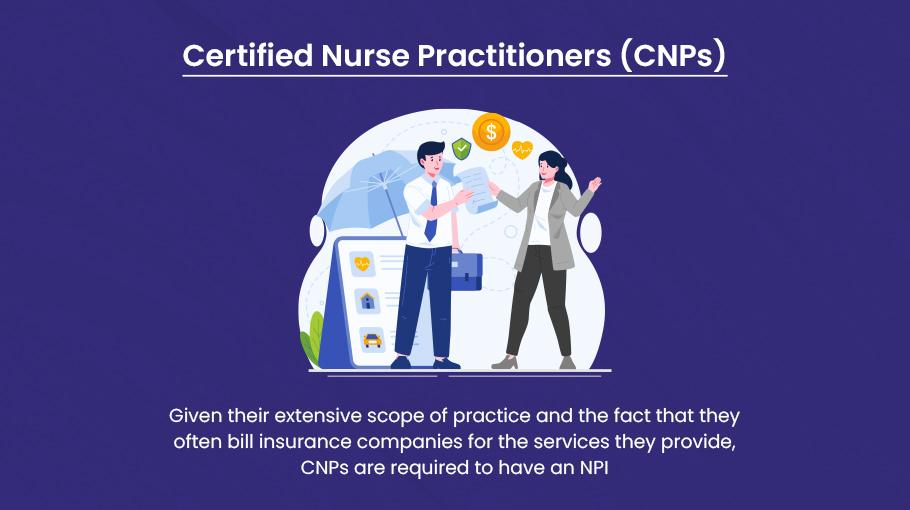
Certified Nurse Practitioners (CNPs) are advanced practice registered nurses who often work independently or in collaboration with physicians.
They provide a wide range of healthcare services, including diagnosing and treating illnesses, prescribing medications, and managing patient care.
Given their extensive scope of practice and the fact that they often bill insurance companies for the services they provide, CNPs are required to have an NPI.
This allows them to be recognized as independent healthcare providers in the eyes of insurers and enables them to submit claims directly to Medicare, Medicaid, and private insurers.
2). Certified Registered Nurse Anesthetists (CRNAs)
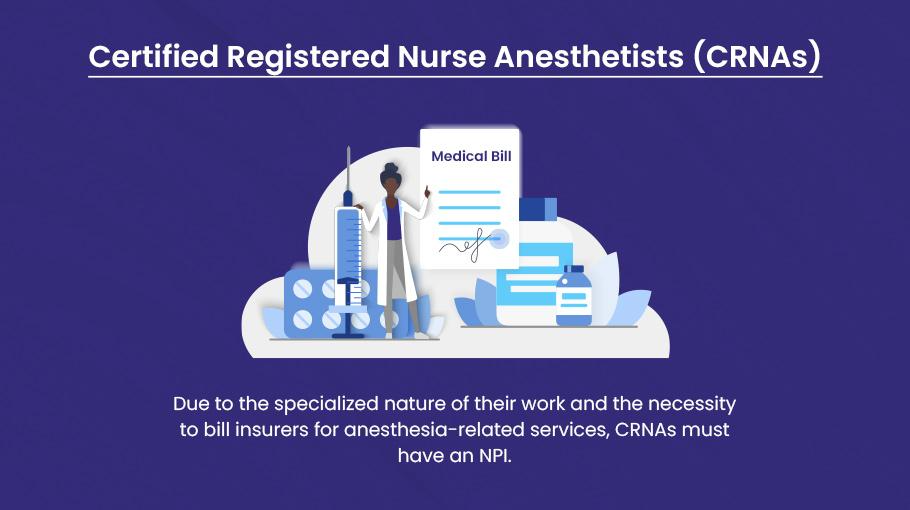
Certified Registered Nurse Anesthetists (CRNAs) play a critical role in the healthcare system by administering anesthesia to patients during surgical procedures.
Due to the specialized nature of their work and the necessity to bill insurers for anesthesia-related services, CRNAs must have an NPI.
This not only facilitates the billing process but also ensures that their professional contributions are properly documented and compensated.
3). Certified Nurse-Midwives (CNMs)
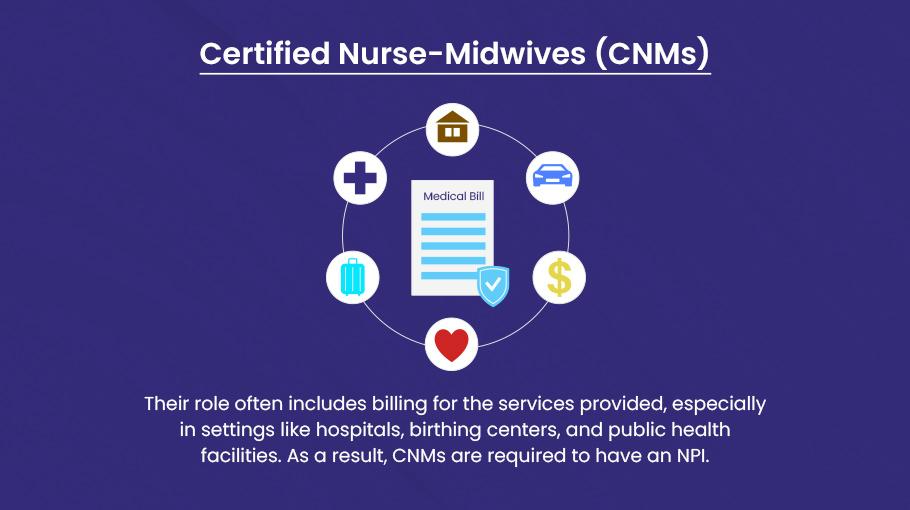
Certified Nurse-Midwives (CNMs) provide comprehensive care to women, including prenatal, childbirth, and postpartum care, and gynecological and primary care.
CNMs usually bill the services provided, especially in settings like hospitals, birthing centers, and public health facilities.
As a result, CNMs are required to have an NPI, which enables them to bill insurance companies and ensures that their services are reimbursed appropriately.
4). Clinical Nurse Specialists (CNSs)
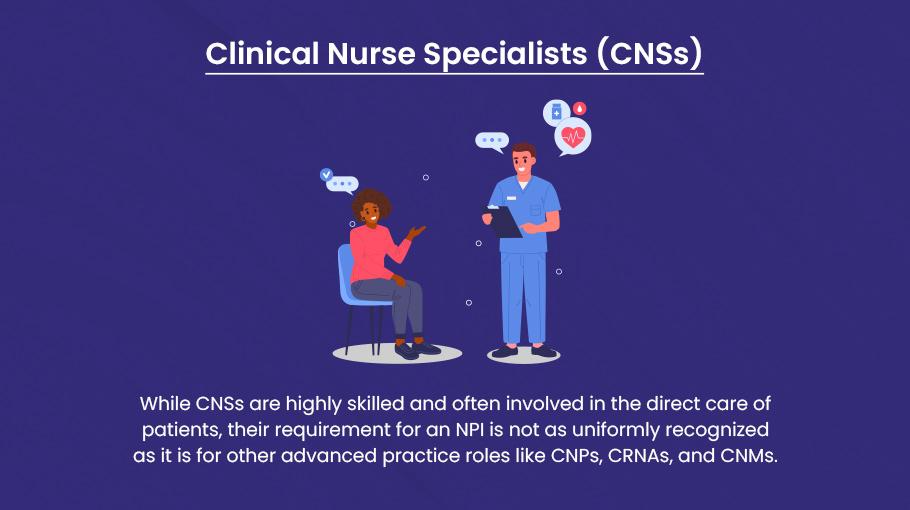
Clinical Nurse Specialists (CNSs) are advanced practice nurses who focus on improving patient outcomes and nursing care within a specialized area of practice, such as oncology, pediatrics, or geriatrics.
While CNSs are highly skilled and often involved in the direct care of patients, their requirement for an NPI is not as uniformly recognized as it is for other advanced practice roles like CNPs, CRNAs, and CNMs.
However, as CNSs increasingly gain prescriptive authority and more states grant them full practice rights, obtaining an NPI may become more necessary to support their growing responsibilities in patient care and billing.
| 🧿 MUST REMEMBER
If you are a Certified Nursing Assistant (CNA), Personal Assistant (PA) Licensed Practical Nurse (LPN) and Registered Nurse (RN) and applying for a NPI number at https://nppes.cms.hhs.gov, you will require providing the Taxonomy Code in the given field in CMS 1500 form. These taxonomy codes can be used for each type: ● CNA: 376K00000X |
How to Acquire an NPI: A Step-by-Step Process for Nurses
Obtaining a National Provider Identifier (NPI) is a straightforward process that can be completed through several methods.
Here is a step-by-step process to acquire your NPI:
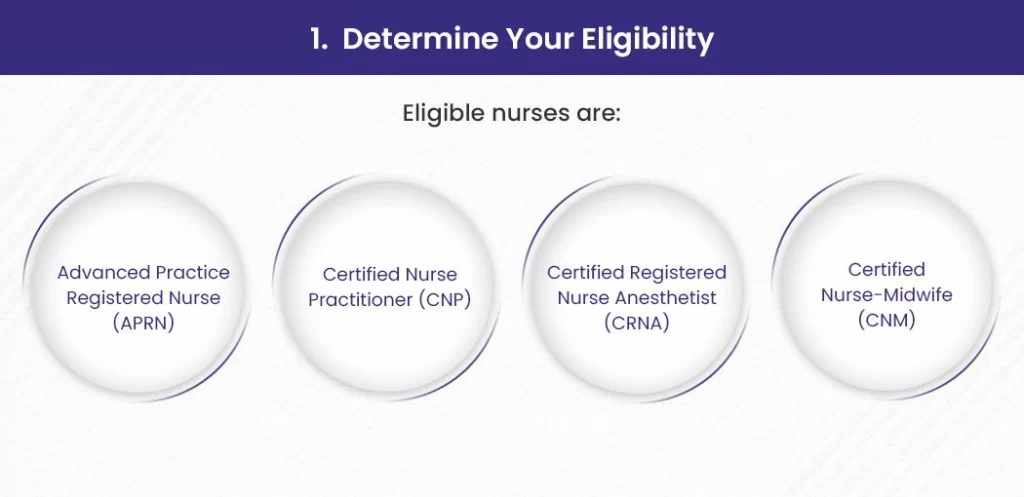
- Determine Your Eligibility
Before applying for an NPI, ensure that you are eligible.
NPIs are primarily required for healthcare providers who need to bill for services, particularly those involved in Medicare, Medicaid, and private insurance.
If you’re an Advanced Practice Registered Nurse (APRN), such as a Certified Nurse Practitioner (CNP), Certified Registered Nurse Anesthetist (CRNA), or Certified Nurse-Midwife (CNM), you will need an NPI.
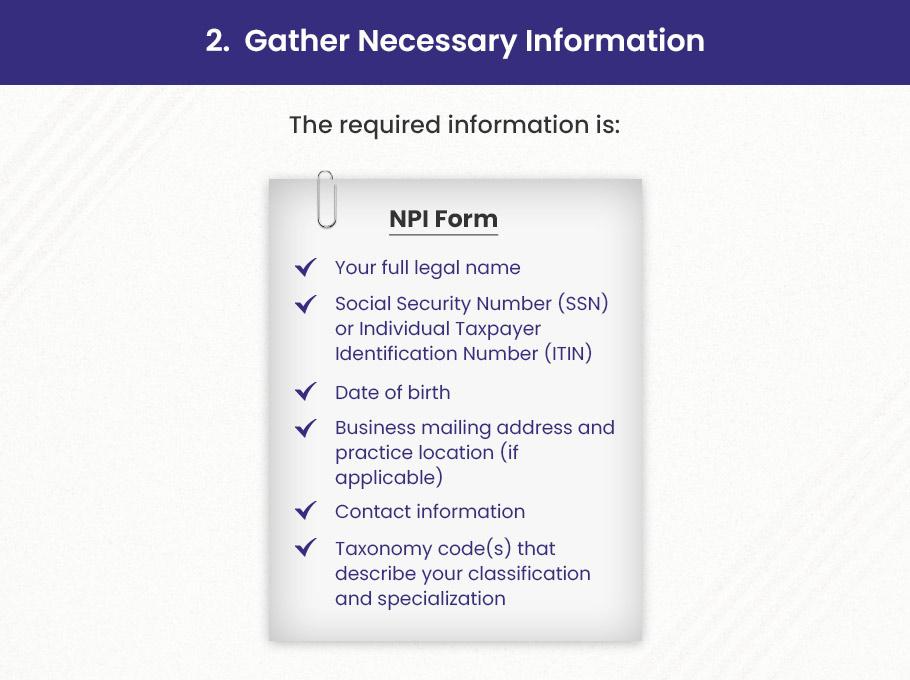
- Gather Necessary Information
To complete your NPI application, you will need to have the following information ready:
- Your full legal name
- Social Security Number (SSN) or Individual Taxpayer Identification Number (ITIN)
- Date of birth
- Business mailing address and practice location (if applicable)
- Contact information
- Taxonomy code(s) that describe your classification and specialization
If you are unsure about your taxonomy code, it is important to research and select the one that best fits your professional role. Taxonomy codes are crucial as they describe the type of provider you are in the healthcare system.
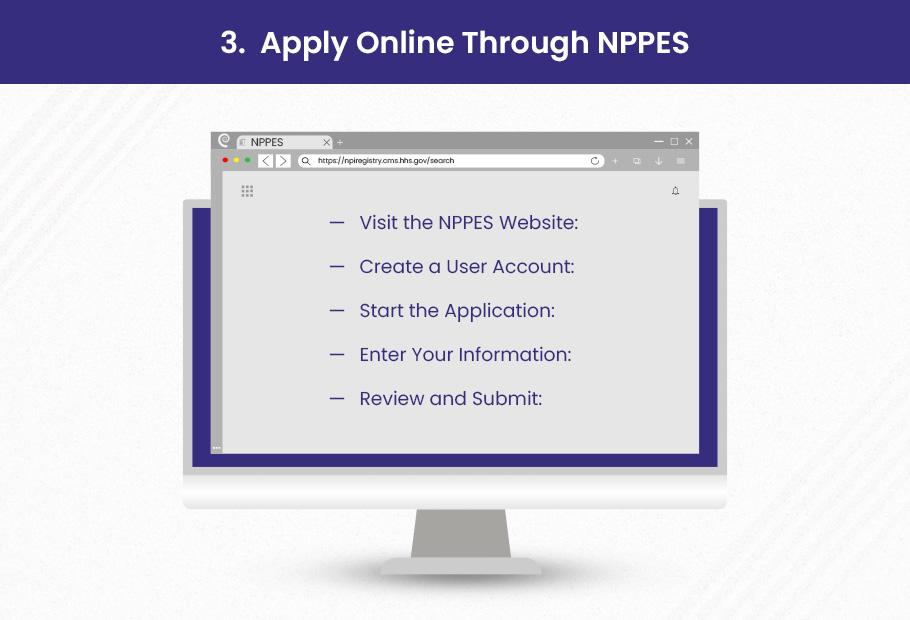
- Apply Online Through NPPES
The most efficient and commonly used method to obtain an NPI is through the online application process via the National Plan and Provider Enumeration System (NPPES).
Here’s how you can do it:
- Visit the NPPES Website: Go to the NPPES website.
- Create a User Account: If you don’t already have an account, you’ll need to create one by clicking on the “Create or Manage an Account” link.
- Start the Application: Once logged in, click on the “Apply for an NPI” link to begin your application.
- Enter Your Information: Fill in the required fields with your personal and professional information.
- Review and Submit: Carefully review your application for accuracy before submitting it. Once submitted, you will receive a confirmation email.
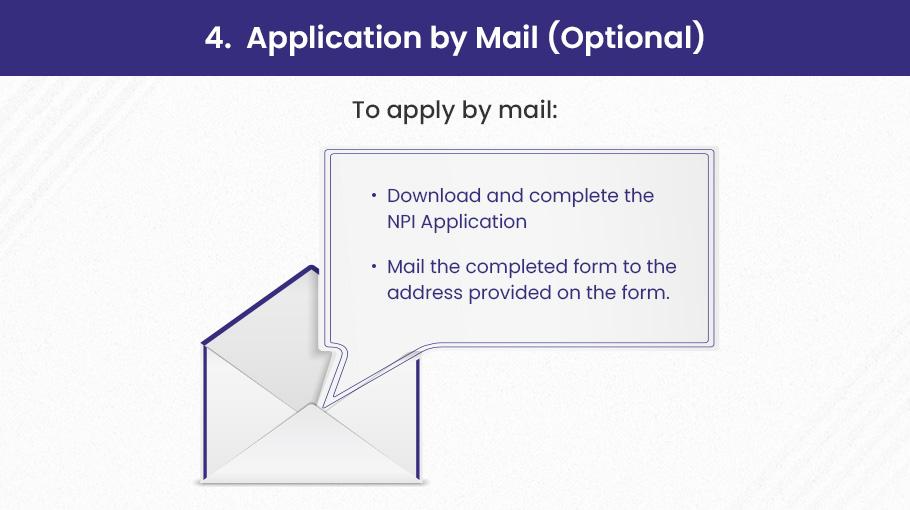
- Application by Mail (Optional)
If you prefer, you can apply for an NPI by mail, though this method is less common and slower than the online application.
To apply by mail:
- Download and complete the NPI Application/Update Form (CMS-10114) from the CMS website.
- Mail the completed form to the address provided on the form.
Keep in mind that tracking the progress of a mail-in application is more challenging compared to the online method.
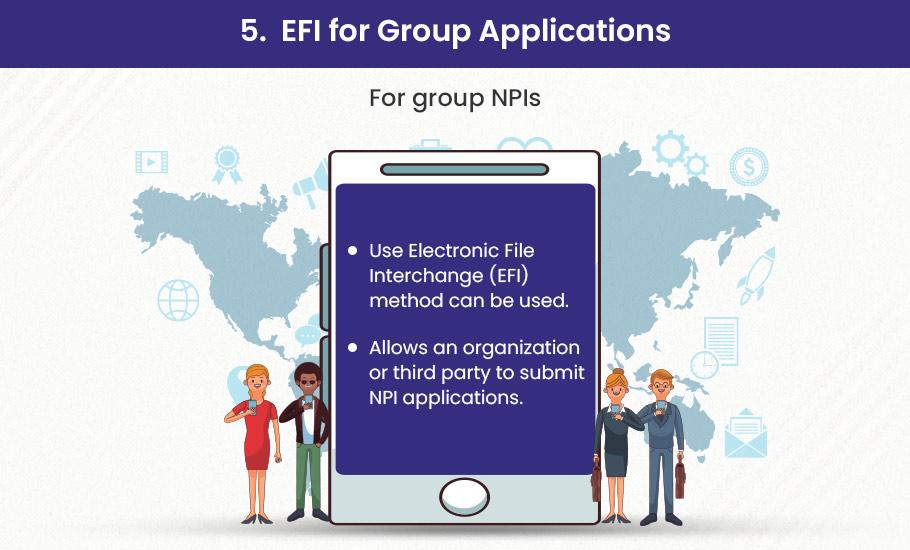
- Electronic File Interchange (EFI) for Group Applications
For organizations that need to obtain NPIs for multiple providers at once, the Electronic File Interchange (EFI) method can be used.
This allows an organization or third party to submit NPI applications in bulk.
This is particularly useful for hospitals, large practices, or healthcare systems managing several providers.
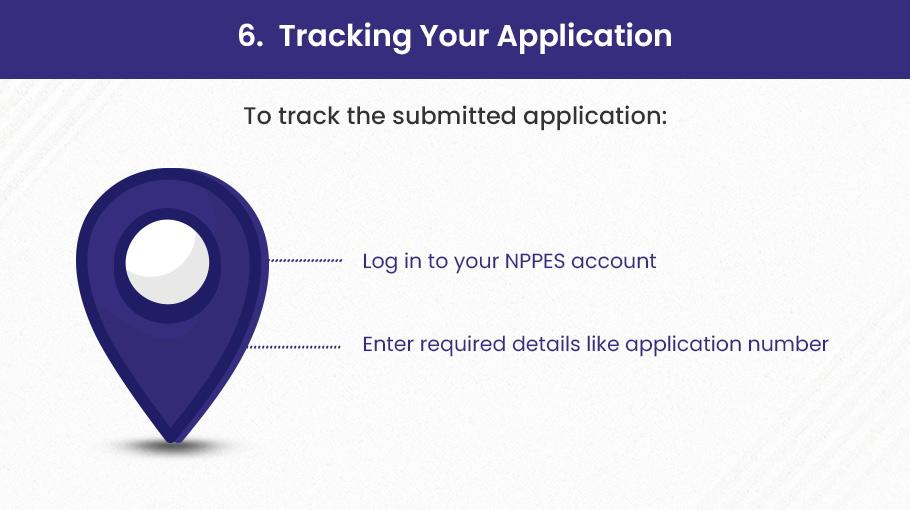
- Tracking Your Application
If you applied online, you can log into your NPPES account to track your application status.
Typically, NPIs are issued within 10 days, though it may take longer depending on the completeness and accuracy of your application.
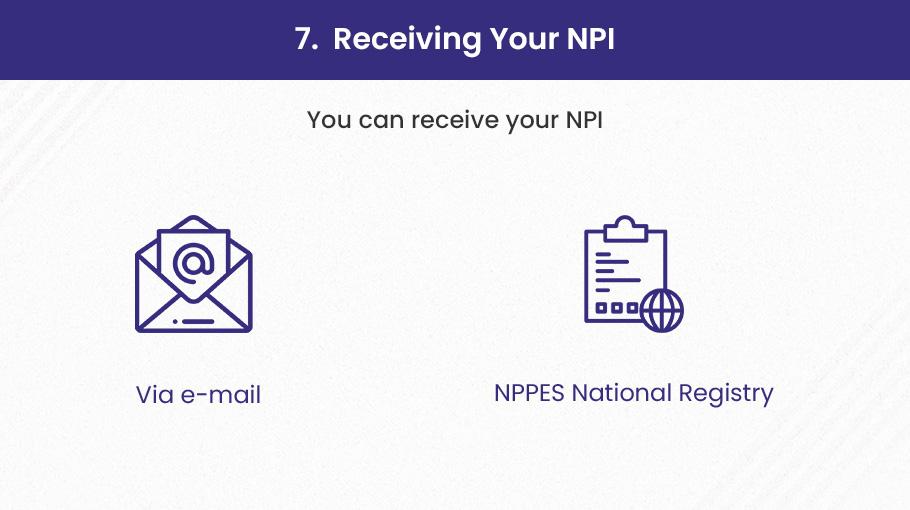
- Receiving Your NPI
Once your application is processed, you will receive your NPI via email.
Your NPI will also be entered into the NPPES national registry, where it is publicly accessible through the NPI number lookup tool.
This registry includes basic information associated with your NPI that is relevant for public knowledge, such as your name, practice location, and taxonomy.
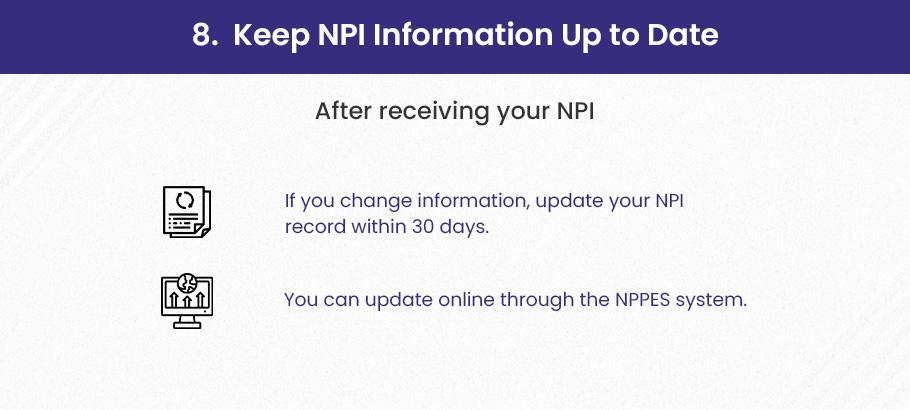
- Keep Your NPI Information Up to Date
After receiving your NPI, it is important to keep your information up to date.
If you change your name, practice location, or contact information, you must update your NPI record within 30 days.
This can be done easily online through the NPPES system.
Conclusion
Obtaining a National Provider Number (NPI) is not necessary for all nurses, but having it can be a wise decision.
NPIs represent more than just a number—they are a key part of the healthcare system’s move towards greater efficiency, transparency, and portability.
As a nurse, securing an NPI, you are not just meeting current requirements—you are positioning yourself at the forefront of the rapidly changing healthcare landscape.
Just as in patient care, where anticipating needs is crucial, being prepared with an NPI ensures you are ready to meet the demands of tomorrow’s healthcare system.





